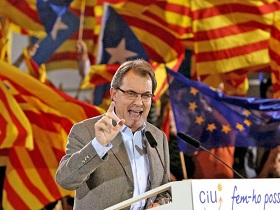The question of whether the Catalan independence referendum initiated by the separatists would eventually take place remained open for quite a while. Under the Spanish Constitution, autonomous communities are not allowed to hold a referendum without the consent of the central Spanish authorities and a positive decision of a nationwide referendum. Therefore, unlike the British Government, which allowed Scotland an independence vote and promised them everything they had asked for, the Spanish authorities chose the unconstructive path of denial.
The question of whether the Catalan independence referendum initiated by the separatists would eventually take place remained open for quite a while. Under the Spanish Constitution, autonomous communities are not allowed to hold a referendum without the consent of the central Spanish authorities and a positive decision of a nationwide referendum. The government of the centre-right conservative People’s Party has been inflexible on the issue, demanding that the Constitution be respected and refusing to discuss any amendments. On September 29, 2014, Spain’s Constitutional Court provisionally suspended the referendum for the next five months at the request of the central government. Therefore, unlike the British Government, which allowed Scotland an independence vote and promised them everything they had asked for, the Spanish authorities chose the unconstructive path of denial.
Many observers thought that after the ruling of the Constitutional Court, the Catalan Prime Minister and the leader of the region’s ruling Convergence and Union (CiU) party Artur Mas would declare early parliamentary elections, where victory would mean the proponents of independence had won the day. Mas, however, did not do so for fear of losing. One of the reasons for his caution was the huge corruption scandal that broke out in July 2014. Implicated in the scandal were Jordi Pujol, who had been head of the Catalan Government for 23 years and was Honorary Chairman of the CiU, and his family members. The scandal threw a shadow on the ruling party and Mas himself, who had called Pujol his “political father”. Another argument against the early election was the reinforcement of the Republican Left of Catalonia (ERC), CiU’s ally in the independence cause.The left Republicans, who had consistently supported the Catalans’ right to self-determination, demanded that an early election be held and Catalonia’s independence be proclaimed in the event of a victory for the separatist parties. Voter polls showed that the ERC was beating the CiU in popularity.
In this situation, Artur Mas started manoeuvring to stay in power. Instead of a referendum, he suggested an alternative poll (“the citizen participation process”), organized at the initiative of NGOs, but supported by the Catalan Government. And while Rajoy’s administration continually declared the poll illegitimate, it did nothing to prevent it either.
The November 9 poll, officially termed “the citizen participation process”, was held in the absence of any democratic guarantees: there were no election commissions, no voter lists, or observers from different parties. The votes were counted by volunteers from NGOs that were supported independence. The respondents had to answer two questions: “Do you want Catalonia to be a state?” and “If yes, do you want it to be independent?”
According to preliminary data (complete data will be published in late November 2014), turnout was 2.3 million out of the 5.4 voters in Catalonia. A total of 80.7 per cent (around 1.6 million) voted “yes” to both questions; 10.1 per cent replied “yes” to the first question and “no” to the second; and the remaining 4.6 per cent voted “no” for both.
The poll and the victory it brought were a personal achievement for Mas. In the run-up to the referendum, the Catalan authorities campaigned aggressively for the “yes” and “yes” answers, convincing the electorate that the vote would have some real political implications. As a result, Mas reinforced his own position as the leader of the separatist movement. He essentially played the central government by changing his tactic and holding the banned independence referendum under the guise of a poll. The results of the vote, as Mas said, “confirmed our will to be a political subject under no-one’s command.”
A large percentage of the Catalonian population does support the idea of independence, believing that the region’s economic potential would allow it to exist independently without Spain. They also assume that Catalonia will become part of the European Union. It must be noted that while EU legislation does not allow membership of regions separating themselves from the member states, it does not prohibit it either. The legal question remains open. That being said, it is hard to imagine all the EU member states agreeing unanimously to accept Catalonia should the region actually apply for membership. Spain itself and other EU members dealing with regional separatism are unlikely to support the application.
Meanwhile, there are divisions within the winning camp itself. Josep Antoni Duran i Lleida, President of the Democratic Union of Catalonia – one of the CiU’s two constituent parties – is against independence and separation from Spain. He believes that Catalonia cannot exist independently. During the poll, Lleida and many of his party’s members, who are essentially proponents of confederation model in Spain, answered “yes” to the first question and “no” to the second.
Following the election, Mas wrote to Rajoy proposingan “ongoing dialogue” to find a political solution to the crisis, in particular by holding a real, “British-style” referendum on the future of Catalonia. He also wrote that if they fail to find a political solution, there was always the option of holding plebiscite parliamentary elections. But the second option, said Mas, would only be possible if the pro-sovereignty parties came up with a joint list of candidates or a joint programme.
To be sure, the poll did not show the real lay of the land among the Catalan voters. The vast majority of proponents of Spain’s integrity ignored the poll as illegitimate. Nevertheless, the results of the vote show that the pro-independence forces have significant potential.
After the poll, the Attorney General’s office initiated criminal proceedings against the main orchestrators of the mock referendum. The prosecutors looked into the state-owned premises that hosted polling stations, and the people who moderated those stations. Still, Rajoy’s policy is not universally supported by his followers. Some members of the People’s Party accuse him of being “indecisive and passive”. Critics say the poll should never have been allowed in the first place. Having said that, sociological research of public opinion shows that it was precisely the uncompromising rigid policy of the central Government that sparked separatism among the larger portion of Catalans.
The Spanish Government received an unequivocal message: It has to resume the dialogue with the autonomous community that was broken off in July (when Mas gave Rajoy a list of 23 proposals on the improvement of various areas of the region’s situation) and start looking for a constructive solution to the “Catalan issue”. Spanish experts think that under the current circumstances it would take a series of meetings and consultations of the Prime Minister and his deputies with many high-level politicians to devise an action plan acceptable to all stakeholders. Dismissing the opinion of a large part of the Catalan population any longer will only destabilize society and create an explosive atmosphere in the country.
More and more voices are being raised in favour of a constitutional reform, which would involve, in particular, a review of a number of current constitutional provisions concerning the territorial structure of the state that are deemed obsolete. For instance, the Spanish Socialist Workers’ Party advocates the transformation of the current autonomy-based unitarian state with elements of federalism into a full-fledged federation.
The upcoming 2015 parliamentary election could break the current stalemate. Polls show that the People’s Party cannot hold onto the absolute majority in the Cortes Generales that it currently enjoys, and will have to contend with the opposition. The Spanish Socialist Workers’ Party is currently hard pressed to find a way out of a deep crisis. A new force has burst onto the country’s political scene – the far-left Podemos (“We Can”), which got 1.2 million votes and 5 seats in the 2014 European parliamentary election in May 2014. In the upcoming election, Podemos could be a formidable rival for the two leading parties. The party, while taking a stance against the separation of Catalonia from Spain, recognizes the Catalans’ right to define their own future. The new balance of forces in Spain may eventually impact its political and territorial structure, including the outcome of the “Catalan issue”.
But for now, all this is just guesswork. Meanwhile, the conflict between the poll-winning separatists and the uncompromising ruling People’s Party is getting worse.







